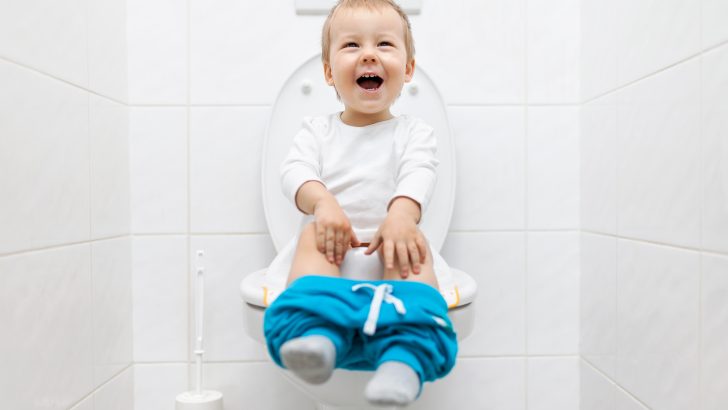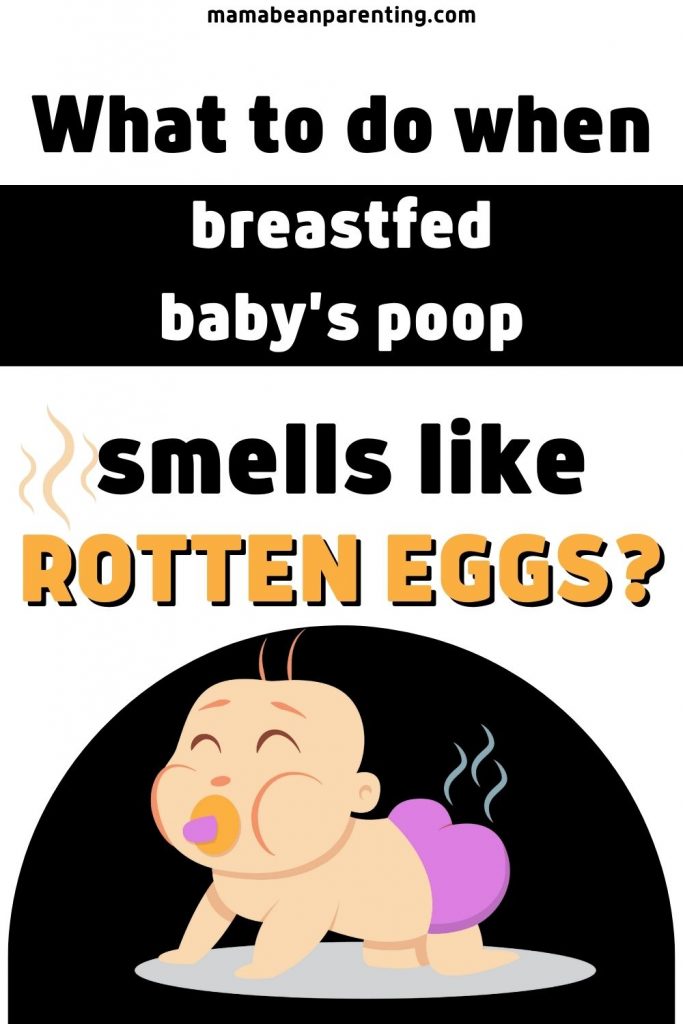As a new parent, you’ve probably used too many things that life with a newborn brings. But then comes a time when you start to wonder why breastfed baby poop smells like rotten eggs?
I mean, I know you didn’t expect it to smell like fresh flowers or perfume, but rotten eggs?
That’s entirely unexpected, am I right?
To tell you right now, there are many reasons why breastfed poop smells like rotten eggs.
It can be because of allergies, infections, or even your diet. But don’t worry! All of these causes can be fixed relatively easily.
Of course, before you start resolving this problem all by yourself, you first need to consult with your pediatrician.
So, I think that both of us are ready to embark on this “aromatic” journey to uncover why breastfed baby poop smells like rotten eggs!
It’s going to be very interesting for both all the breastfeeding moms out there and me!
Breastfed Baby Poop Smells Like Rotten Eggs- Major Reasons
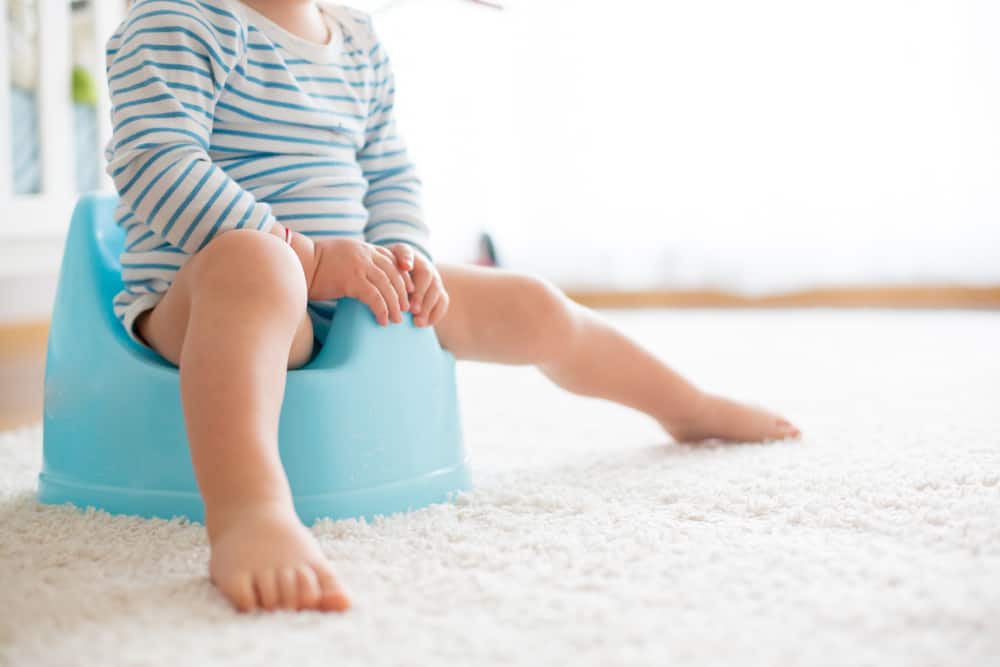
Baby’s Diet
One of the major reasons why breastfed baby poop smells like rotten egg is precisely this one. Don’t forget that your newborn has a very sensitive digestive system.
Just up until recently, you’ve been feeding your child with nothing but your breast milk; therefore, now that you start adding solid food to its diet, the baby’s digestive tract is probably in a state of shock.
I mean, not literally, but you get the point.
Generally speaking, breast milk is very light on the child’s belly, meaning that it can easily be digested.
Well, that’s not actually the case with solid foods.
How come?
That’s because they are packed with nutrients that are at times very difficult to digest and sometimes, even impossible.
I’m talking to you, fiber!
That’s why once you start feeding your child solid foods, its body will be forced to work much harder to properly digest everything and break down bigger compounds from the food into smaller ones.
Therefore, if you’ve just started feeding your baby solids and then you noticed your breastfed baby poop smells like rotten eggs, then it’s most likely because of this.
It’s just its digestive system doing its best to “embrace” new sorts of nutrition.
Another reason why breastfed baby poop smells like a rotten egg after feeding your baby solids because it takes lots of time to digest this type of food. Hence it is sitting in the GI tract much longer.
Thereby, it isn’t something you should worry about.
Breastfed baby poop that smells like rotten eggs will be a thing of the past once its digestive system gets used to this type of feeding.
What Are You Eating?
As a breastfeeding mom, you need to remember the fact that your diet can definitely affect the quality of your breast milk.
If you’re eating too many foods that are rich in sulfur, such as eggs, dairy, veggies (brussels sprouts, cabbage, cauliflower, etc.), and meats, all of these sulfur-rich foods will find their way to enter the breastmilk.
And that’s how you get a breastfed baby poop that smells like rotten eggs because these foods cause very unpleasant odors.
Since your baby mostly eats your breastmilk (at least during the first year), the smell of its poop, gas, and urine will directly be impacted by it.
So what are you supposed to do then?
If you don’t want your breastfed baby poop to smell like a rotten egg, then I suggest decreasing the sulfur intake.
I know that something like this is going to be hard because sulfur is present in most foods.
However, it wouldn’t hurt to try it for a while. You need to give it a try, at least, if you want your baby’s belly to be better.
Beyond that, sulfur is actually very beneficial for your health. It plays a significant role in lowering the risk of chronic issues like neurodegenerative problems and heart-related problems.
That’s precisely why it shouldn’t be entirely eliminated from your diet.
On the other hand, if smelly baby farts and poop, do not bother you, then feel free to have a healthy, balanced diet, that contains sulfur in moderation.
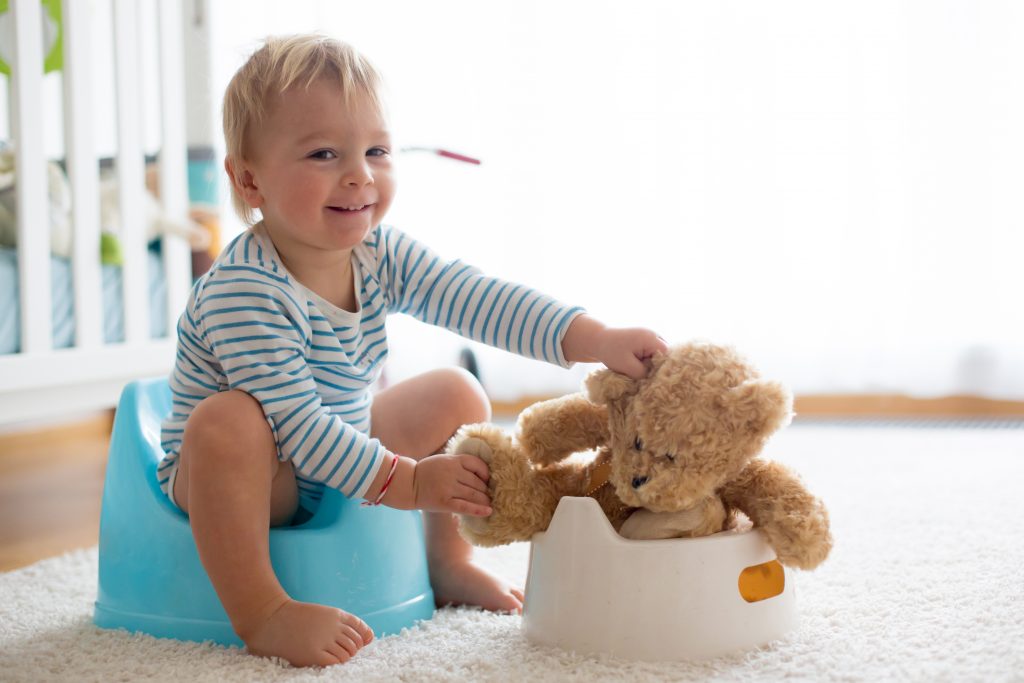
Cow’s Milk Might Be the Problem!
Another common reason why breastfed baby poop smells like rotten eggs is this one as well.
Namely, you are probably familiar with the fact that babies under the age of one should not consume cow’s milk.
Why is that?
Well, that’s because their underdeveloped GI tract is not capable of digesting the amount of protein that’s inside cow’s milk.
Human milk, on the other hand, contains drastically less, which is why breastfeeding doesn’t cause practically any problems to its digestive system.
Cow’s milk protein is one of several compounds that go directly into breast milk, and a vast majority of conventional infant formulas contain cow’s milk protein and lactose.
In case you didn’t know, lactose is a sugar found in dairy products.
And just like adults, some newborns are a lot more sensitive to cow’s milk protein; hence they develop an intolerance to cow’s milk.
But bear in mind that lactose intolerance is not the same as an allergy to cow’s milk.
Fortunately, lactose intolerance is something that can go away on its own as your baby gets older and develops a stronger GI tract.
Babies with serious intolerance to cow’s milk protein oftentimes experience smelly baby farts, excessive gas, fussiness, and may even have a stool that contains mucous or blood.
If you want your breastfed baby poop that smells like rotten eggs to go away, then for starters, you need to eliminate dairy products from your diet completely.
And then turn to non-dairy options, such as plant-based milk or soy-based formula (if you’re not breastfeeding your infant).
You will quickly see that decreasing the overall consumption of dairy products is going to eliminate a baby’s smelly farts and excessive gas, and you will no longer have the issue of a breastfed baby poop that smells like rotten eggs.
A Lot of Air Is Being Ingested
If you notice that your breastfed baby poop smells like rotten eggs plus it has excessive gas, then it can be cause it is receiving a lot of air during breastfeeding. (this refers to breast milk from the bottle as well)
And then that air turns into a very aching gas in its little stomach and causes smelly baby farts and poop.
Apart from breastfed baby poop that smells like rotten egg, if you notice that it also burps and farts too much after it’s done breastfeeding (or eating from the pumped bottle), then there’s probably a lot of air in the pumped bottle.
Or maybe, you are not holding the pumped bottle the right way.
Maybe It Could Be Gastroenteritis
When a breastfed baby’s poop smells like rotten eggs, it can be because of gastroenteritis.
So what does it mean?
Namely, it can be defined as stomach flu. And the most common symptom of it is diarrhea and smelly baby farts.
Although something like this normally relieves itself within a few days, there are some steps you can take to speed this process up and lessen its effects of it.
So what can be done?
The biggest concern when something like this happens is if the baby is going to experience dehydration.
Luckily, it is preventable. In order to do so, be sure to give your infant things like water, formula, Pedialyte, and breastmilk.
If you incorporate any of these abovementioned things, you will mitigate various symptoms, including breastfed baby poop that smells like rotten eggs.
In case you didn’t know, rotavirus is one of the most common causes of this condition and can frequently cause severe dehydration.
However, something like this can be avoided for sure, if you opt for regularly scheduled vaccines.
What Does Normal Baby Poop Look Like?

Now that I covered some basics concerning breastfed baby poop that smells like rotten eggs, it’s time to answer this question.
I mean, no matter how much you loved your baby, the truth is, its poop is generally very “unpleasant” (I’m trying to be nice).
A poop that smells awful isn’t necessarily a reason for concern unless it’s so unbearable that you must clean your room immediately.
In the first 6 weeks of its life, your little one must have at least 3 bowel movements every single day.
Although it’s completely normal if it has up to twelve poops.
Of course, as time goes by and your kiddo becomes better at absorbing nutrients, it will poop less.
How can we define a normal poop schedule?
Well, if we’re talking about a breastfed baby that’s older than 6 weeks, then it can poop every day, or even once a week.
As long as you notice that your baby is generally healthy, that it is gaining weight, and changing a few diapers per day, it shouldn’t raise any concerns.
When Are You Supposed to Be Concerned Then?
It appears to be like babies are changing daily, and the same goes for their poops as well. As I previously mentioned, as they get older, their GI tract becomes much stronger.
That’s because they’ve been exposed to a variety of different foods. However, if you notice any of the following, then maybe it’s time to consult your pediatrician:
1. Tarry, black, and sticky poop after the meconium has passed may be a sign that there’s some bleeding in the upper GI tract.
2. Bloody 0r red-tinged poop can be caused by lower digestive tract bleeding.
3. Poop that is very thin (pencil-like appearance), is watery or has mucus.
4. If you notice that your baby is crying each time it poops, plus the stool is very dry and hard.
5. Pale-color stool may be a sign that your baby is having difficulties absorbing all the nutrients from your breast milk.
What About When Breastfed Baby Gas Smells Like Rotten Eggs?
If you thought that breastfed baby’s poop is smelly, you were seriously wrong. Breastfed baby gas can smell like rotten eggs too!
One of the main reasons why breastfed baby gas smells like rotten eggs is due to formula or breast milk.
If a formula-fed baby has that stinking baby fart, then you should definitely check the label to see if it contains lactose.
Just like with a baby’s smelly poop, in these instances, you should visit the pediatrician to see if gastroenteritis may potentially cause this.
Other Reasons For Unpleasant Gas Smell
Besides the ones that I just mentioned, there are several other reasons why the baby’s farts smell awkward.
1. Constipation – Constipation in babies is quite common and that’s something that strikes adults as well.
Although that’s something that mostly hits formula-fed babies, it can occur to all of them. If your baby has frequent gases (smelly, or not) it can be because of it.
So pay attention to the frequency of the bowel movements.
2. Medicines – If your little one is taking some medications (for various reasons), they may affect the GI tract causing excess farting and even smelly gases.
Also, this can happen even if you’re taking some medications or supplements.
3. Stress – A vast majority of people do not think that babies can experience stress, but that’s actually far from reality.
Just like adults, babies can be stressed out too and are oftentimes aware of what is going on around them.
It is widely known that stress can negatively impact the digestive system, so if that’s the case with your little angel, then be sure to find a way to relax it.
Different Positions to Alleviate Gas In Babies
If passing gas seems like a struggle for your baby, then there are some things that you can do to help your baby successfully overcome it.
For starters, you can try out several positions to effectively mitigate gas in your little one.
1. It’s tummy time! – Now, this isn’t only entertaining for your baby, but beneficial too! In case you didn’t know, pressure on the stomach can help with digestion by breaking up air bubbles. Apart from that, your baby’s stretching can also stimulate the movement of gas through its body.
2. Knees to chest – This method is similar to the previous one. Pressure from the legs onto the tummy can also help with digestion by breaking up air bubbles. Furthermore, it will encourage the passing of gas through the GI tract.
3. Moving on to cycling – Here’s another highly effective method for all gassy babies. Namely, the cycling of its legs from and to the chest stimulates the gas to go through the intestines quickly.
4. Baby Wearing – This does not only keep your little angel close, safe, and sound, but it also puts it in the upright position with small pressure on the stomach.
Something like this, for sure, streamlines gas working its way through.
Baby Has Gases That Smell Like Rotten Eggs, but There’s No Poop?!
If you notice that your breastfed baby farts smell like rotten eggs, yet there’s no poop, don’t worry; that’s actually quite normal and common among breastfed babies.
When the baby is eating, it may take in lots of extra aid. That air simply must find a way to escape, and this happens either through passing gas or burping.
At times, when the baby’s farts smell like rotten eggs (or even without a particular odor), it may also indicate that poop is on the way or that it is eating too fast.
Who knows, maybe your baby took vast amounts of air while eating.
When to Worry When the Breastfed Baby Gas Smells Like Rotten Eggs?
If the baby’s gas smell awful and has any of the following symptoms, then it’s time to consult your pediatrician as soon as possible:
1. Your baby is hysterically crying for over three hours or several days per week.
2. Your baby isn’t gaining any weight or is losing a significant amount of it.
3. Is constantly throwing up.
4. Has a fever of 100.4 or higher
5. You notice blood in the diaper
6. Hard or bloated tummy that doesn’t retreat even after your baby has burped or passed gas
Generally speaking, when breastfed baby gas smells like rotten eggs shouldn’t usually raise any concerns.
However, when the breastfed baby gas smells like rotten eggs, and your little one is experiencing any of the aforementioned symptoms, then seek medical help immediately!
The Best Feeding Positions For an Infant
There isn’t a single ideal feeding position (this refers to formula-fed babies too). You need to try out different ones to determine which one is the best.
Below I will add several breastfeeding positions that will cause the baby to digest the food and enjoy its mealtime properly.
1. Cradle-Hold – Your little one’s head should rest in the bend of the elbow of your arm on the side it has latched on. Its body should be against your stomach.
Even though this is a position that’s very popular among babies, with newborns, it may be difficult to execute it.
2. The side-lying position – This one is generally very practical and easy to do, especially if you’re feeding your baby in the middle of the night. Both you and your child should lie on your side, tummy to tummy.
3. Laid-back position – This position is also known as biological nurturing and a method that most moms love to try first.
So how is it supposed to be done?
Lean back on your sofa or bed, your baby from the stomach to stomach, onto your body with the head close to your breast.
A majority of infants will immediately latch on one of your breasts. It is an overall ideal position for newborns, the ones with excessive gas, and mothers with smaller breasts.
Conclusion
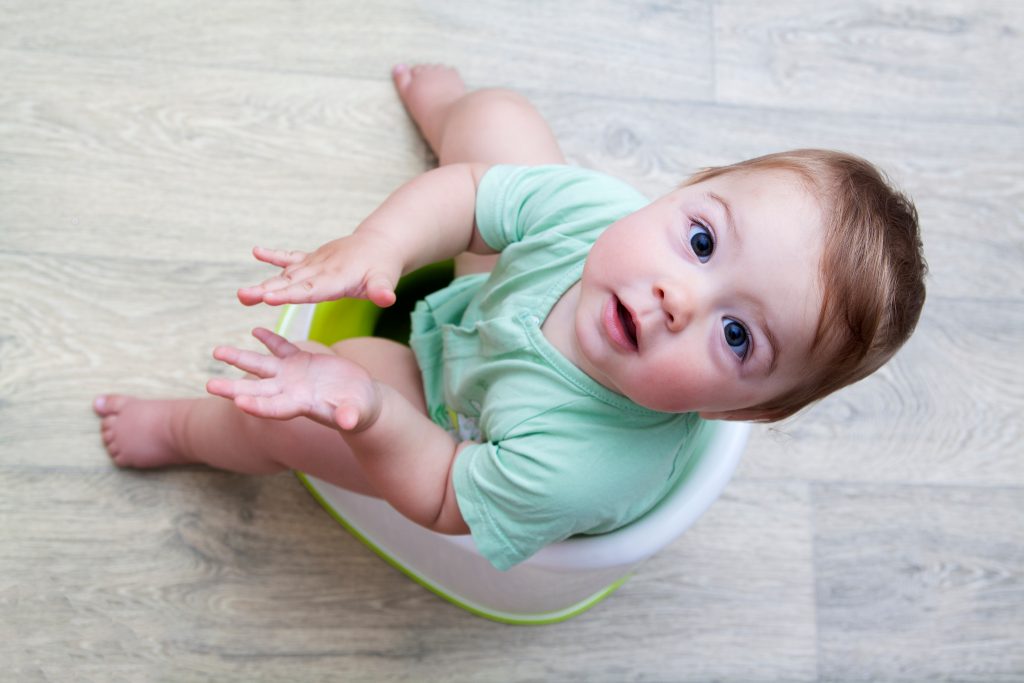
When breastfed baby poop smells like rotten eggs, I know that it can potentially cause some concerns. However, as you can see, apart from serious ones, many benign reasons may lead to this.
So before you start panicking, please be sure to first go through everything that’s been written here so you can calm yourself down and realize that it most likely is absolutely nothing too alarming.

Well, hello there!
My name is Jennifer. Besides being an orthodontist, I am a mother to 3 playful boys. In this motherhood journey, I can say I will never know everything. That’s why I always strive to read a lot, and that’s why I started writing about all the smithereens I came across so that you can have everything in one place! Enjoy and stay positive; you’ve got this!

